There are many lactose intolerant people who love cheese and dairy products.
The sharp taste of cheddar simply tastes great, especially on grilled cheese sandwiches!
But is the joy of cheese and dairy worth the bloated feelings and gas that come afterwards?
There is a lot of debate about whether lactose intolerance and milk and cheese can co-exist. Or if lactose intolerant people can eat some types of cheeses but not others.
The goal here is to answer questions that lactose intolerant individuals have about cheese.
I promise that even if you are lactose intolerant, this does NOT mean you have to deprive yourself of cheese!
Let’s dive in.
1 – Parmesan Cheese

Parmesan cheese is an aged cheese and is nearly lactose free.
This makes it a great option for lactose intolerant individuals. Parmesan is made from cow’s milk and aged for a long time, so lactose is only barely present in the final product after processing!
You can buy parmesan already grated to save time if needed or grate your own fresh batch at home! It will taste much fresher this way too.
Parmesan contains 0.0 to 3.2 percent lactose.
2 – Aged Cheddar
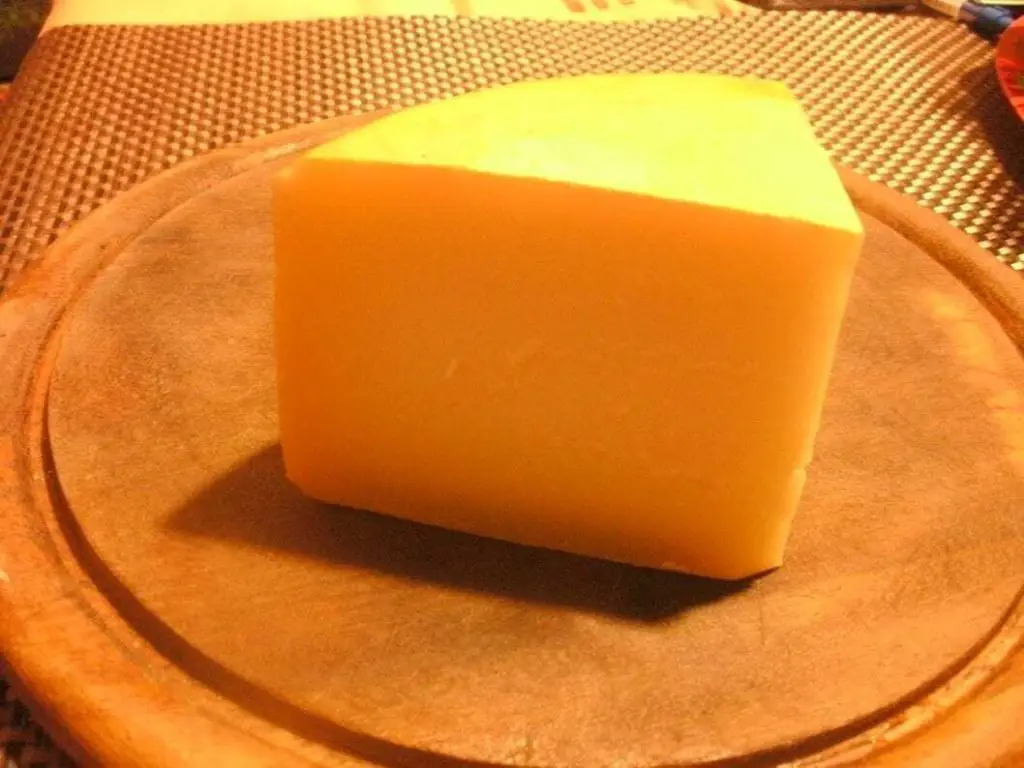
Aged cheddar is another lactose-free cheese option for people who are lactose intolerant.
Cheddar is a hard whitish or light yellowish cheese that originated in the United Kingdom and has become popular as an American favorite as well!
It can be purchased already grated to save time if needed. But it will taste much fresher if freshly grated, so I recommend buying whole blocks of aged cheddar and grating at home as neeced!
The lactose content of mild cheddar, which is softer and not aged for long is about 0.0 to 2.1 percent. Hard cheddar, which is aged longer, generally has less lactose although it too can have amounts up to 2.1%.
3 – Gouda
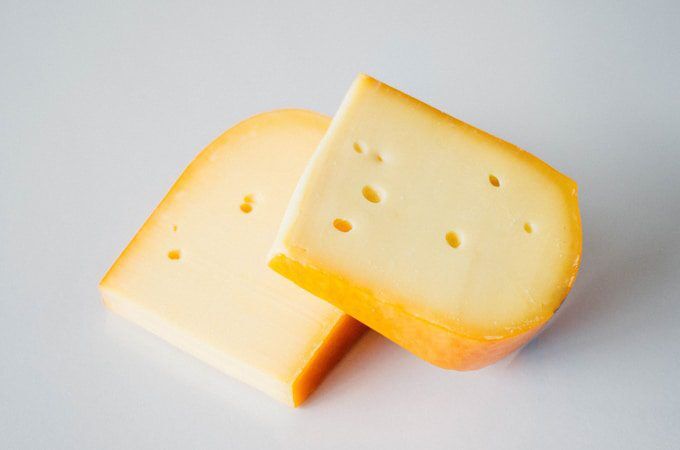
Gouda is my favorite cheese. As a kid my family would always serve Gouda cheese as an appetizer when friends and family came over.
They would have a cheese slicer and those zesty green olives stuffed with garlic. I can vividly remember the smoky taste of the gouda blending perfectly with the zesty olives to this day!
Turns out Gouda is also a great cheese if you are lactose intolerant.
Gouda is a semi-soft cheese and only contains 0.0 to 2.2% lactose.
It’s one of the best types of low-lactose cheeses if you ask me.
There are so many different flavors now such as blue gouda. These all pair nicely with those salty olives my family used to serve up all those years ago.
I also love it served alongside some fresh fruit or on its own as well. There really isn’t much that Gouda can’t pair with in terms of food options!
4 – Brie
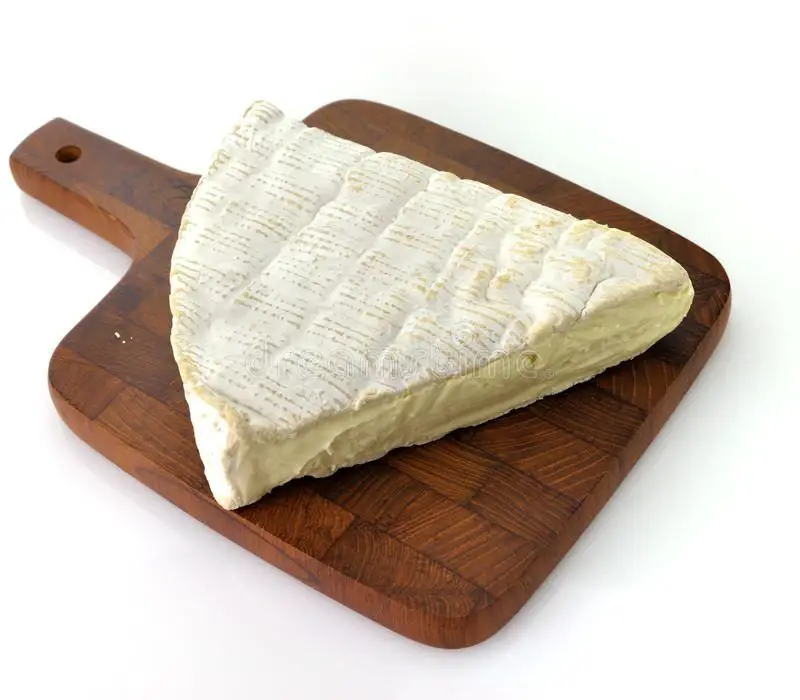
Another one of my favorite cheeses to eat is Brie. And Brie happens to be very low in lactose too!
Brie is a white cheese that has become popular in the United States over recent years. It’s creamy texture and mild flavor makes it an excellent option for lactose intolerant individuals!
The lactose content of Brie ranges between 0.0 to less than 0.50 percent lactose per serving size. Thus making Brie one of the lowest lactose cheeses out there!
Add some brie on top of your favorite salad or eat alongside fresh fruit for a perfect pairing any time of day too!
However, technically speaking according to Lactose Free 101, “Lactose content can be so low in Brie that it is nearly undetectable, yet since it does generally contain some amount of lactose, however small, we can’t call it a lactose-free food”.
5 – Blue
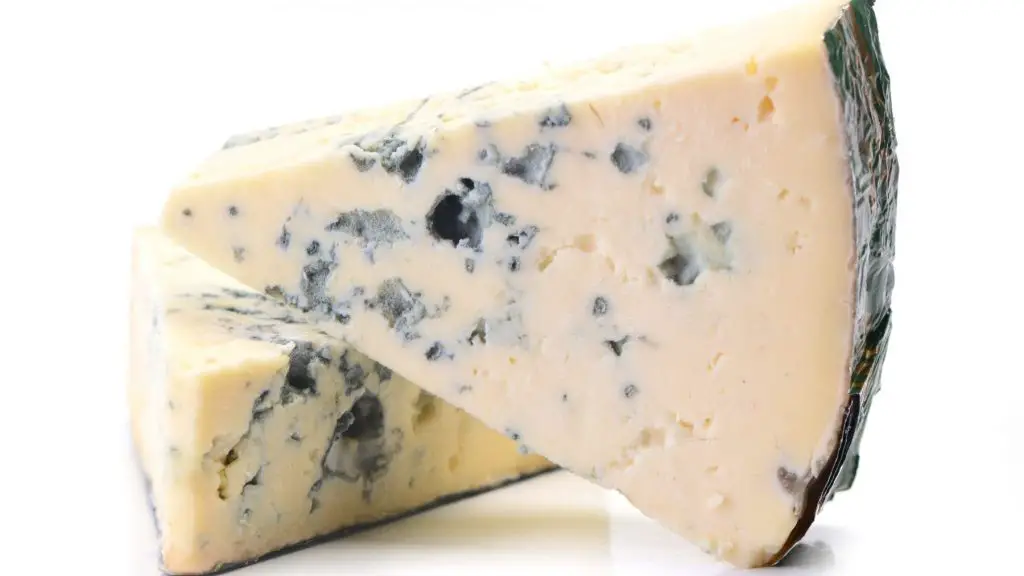
I am lucky in that I like pretty much every type of food.
I’m like a human garbage disposal! But for years the one food I did not like was blue cheese.
I didn’t like the sharp taste for some reason. But my taste buds changed over the years and I remember being pleasantly surprised one day at a work event.
I had accidentally taken some crackers and cheese. But little did I know I had grabbed the blue cheese and now I had a mouthful in front of my coworkers!
I probably would have spit out the cheese due to reflex, but the presence of my coworkers stopped me.
And for whatever reason, after I made it through that one event, I have come to love blue cheese.
Cheese lactose content chart
Wondering about cheese lactose levels? Here is a cheese lactose content chart from the Australian Dietary Guidelines.
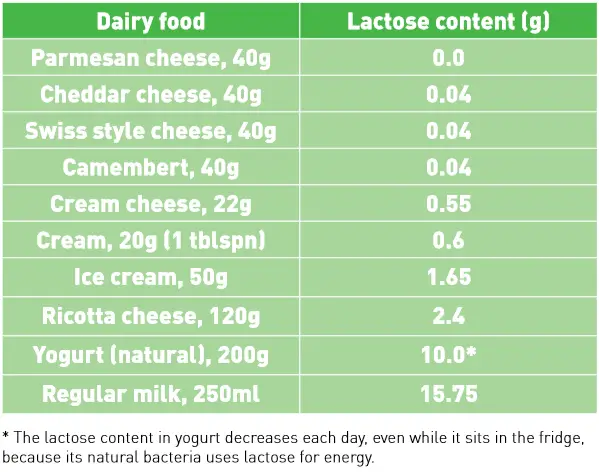
Can lactose intolerant people eat blue cheese?
And, yes, you guessed it. Blue cheese is really low in lactose, containing 0.0 to 2.5% lactose.
If you are lactose intolerant you can have blue cheese 🙂 Enjoy!
And now that we have talked about cheeses low in lactose, let’s look at the opposite end of the spectrum.
The worst cheese for lactose intolerance
Unfortunately lactose intolerant individuals will need to avoid cheese products that are high in lactose.
These include cream cheese, cottage cheese, lactose free pizza cheese and ricotta cheese.
Notice a pattern?
Cheese with the highest lactose include cheese spreads, soft cheeses like Camembert, cottage cheese and mozzarella.
All of these have more than 17 percent lactose per serving size, which is way too much for most lactose intolerant people to handle!
So lactose intolerant individuals should avoid these cheeses.
While it’s hard to pinpoint the ‘worst’ cheese for lactose intolerant people, the best answer to that question is cream cheese.
Cream cheese contains about the same lactose as other high lactose cheeses like mozzarella, however, cream cheese is more commonly bought and used.
Therefore in our opinion, cream cheese the worst cheese for lactose intolerant people.
Please remember too that dairy products produced from cream, such as ice cream, cream cheese, custard, or butter, should also be avoided.
Best cheese for dairy sensitivity
If you’re looking for a great low lactose cheese and chocolate chips, look no further than the variety made by Vermont Creamery.
This delicious cheese is perfect for those who are sensitive to dairy, as it is completely lactose free. Vermont Creamery’s lactose free cheese is also made from 100% organic milk, so you can be sure that you’re getting the best possible quality.
Another great option is the goat milk cheese from La Maison du Chevre. This cheese is also lactose free, and it has a milder flavor that many people find to be more enjoyable. Goat milk cheese is also a good option for those who are looking for a healthier alternative to cow’s milk cheese.
A similar option like goat milk cheese is buffalo milk cheese. Buffalo milk cheese is also lactose free and has a similar nutritional profile to goat milk cheese. It is a good choice for those who are looking for a healthier alternative to cow’s milk cheese.
Finally, another great lactose free cheese option is sheep’s milk cheese. Sheep’s milk cheese is rich and creamy, and it has a higher fat content than other lactose free cheeses. This makes it a great choice for those who are looking for a more indulgent lactose free cheese.
We can’t really tell you the ‘best’ cheese for dairy sensitivity because that depends on your taste buds!
However, we hope the above ideas help! Here are some more too!
Cheese for lactose intolerant list
Here is a list of cheeses and lactose free cheese brands for people with lactose intolerance:
- Dairy Free Cheese
- Almond Cheese
- Rice Cheese
- Soy Cheese
- Nutritional Yeast Cheese
- Vegan Gourmet Cheese
- Daiya Cheese
- Follow Your Heart Vegan cheese
- Galaxy Nutritional Foods Vegan Mozzarella Style Shreds
- Tofutti Better Than Cream Cheese
- Wayfare Dairy Free Cheddar Wedge
- So Delicious Dairy Free Shreds
- Violife Just Like Feta Block
- Sheese Vegan Cheddar
- Garlic & Herb “Boursin” style Cheese
Want to learn about a lactose intolerant cheese maker? Read here to learn how to make lactose free cheese.
Other dietary tips to go lactose free
I also typically give this piece of advice to lactose intolerant individuals who are looking quick solutions:
A great and easy option is to try Lactaid Pills.
Lactaid pills are lactase enzyme supplements. They can help reduce lactose intolerance symptoms when taken before eating foods with lactose in them.
At the eating center where I work, some people will become very bloated and gassy after they eat dairy. But, I’ve noticed that if they take a lactase pill or two then they are able to eat dairy products without any discomfort at all.
So if you are looking for an easy way out, try using these pills before your next meal of cheese and crackers! And enjoy the cheesy goodness once again 🙂
What is lactose intolerance?
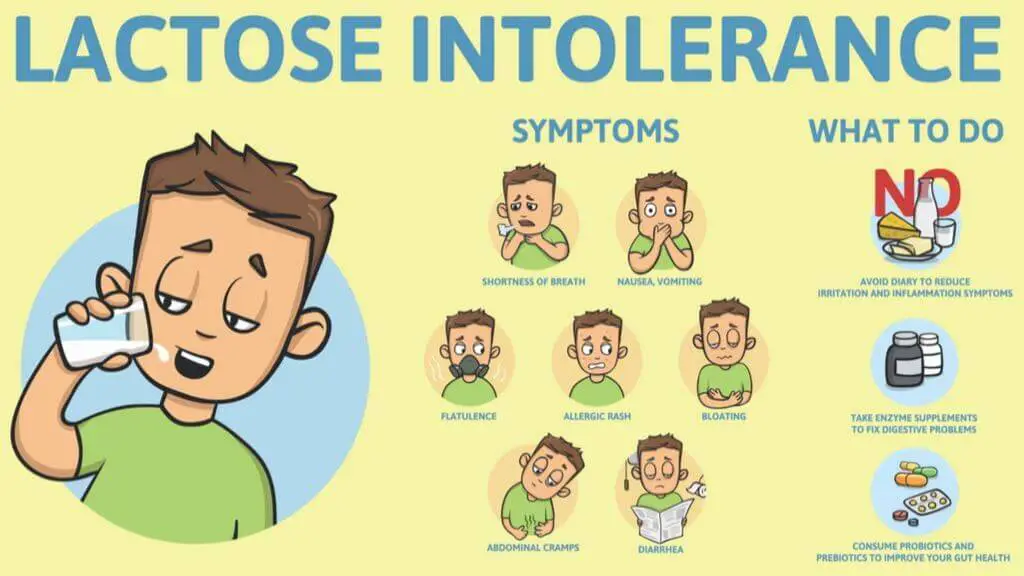
Lactose intolerance is when your body does not have enough lactase to break down lactose, a sugar found in milk and other dairy products.
The lactose then sits in your colon and ferments, creating gases that cause bloating, cramping, nausea, etc. Kind of like lactic acid buildup in your muscles, but just within your stomach instead!
If you are lactose intolerant I feel for you! It can be hard finding food items with labels that read “lactose free”.
And it’s always a bummer finding out that cheese has lactose after eating an entire bag of mozzarella sticks!
If you’re lactose intolerant, you may wonder if all types of dairy are created equal. Are there some types of dairy that will be easier on your stomach than others? Or do you have to avoid dairy entirely?
Good news. You can have foods that contain lactose, and you can also have a home free of allergies, lactose and more!
For now let’s talk about the difference between cheese and milk.
Is cheese or milk worse for people with lactose intolerance?
This is a question that lactose intolerant people often ask.
Generally speaking milk contains more lactose than cheese.
Thus, on average milk is worse for lactose intolerance.
But why is milk worse for lactose intolerance? In other words, why does milk have more lactose than cheese?
Well, cheese is made from milk, let’s remember. You first need milk to make cheese.
During the cheesemaking process, some of the lactase in the milk is broken down by bacteria, so the cheese ends up with less lactose in comparison with milk.
What types of cheese are best if lactose intolerant?
Not all cheese is created equal. Some cheeses have more lactose in them than other types of cheeses.
A general rule of thumb is that aged cheeses will have less lactose. Why?
It’s simple. The longer the aging process (fermentation) goes on, the more lactose is broken down by bacteria. .
The cheeses below all have a miniscule amount of lactose, and you should be fine even if you are lactose intolerant. But some people with lactose intolerance are more sensitive than others and will still get bloated and gassy from these cheeses.
No matter how aged a cheese is you can still get bloated if you have a more sensitive stomach!
If you are lactose intolerant make sure to always look for cheeses that have “lactose free” on the label. This doesn’t necessarily mean “zero” lactose, rather it usually means very small amounts.
In addition, look at the label because many manufacturers also include dairy products and chemicals in their processed food items.
Watch out for the Lactaid brand too. They produce lactose-free hard cheeses which lactose intolerant individuals can enjoy.
Remember that lactaid brand is lactose-free, not casein free! If you are also allergic to milk protein you need a lacto-ovo vegetarian cheese instead.
Lactose Intolerant Cheese Conclusion
We hope you found these tips helpful and that they will help you make better choices when it comes to your diet.
Overall, just please know there are many naturally lactose free cheeses. So if you were wondering about whether they lactose-free cheese … yes, they do make lactose-free cheese!!
If you have any other questions about lactose intolerance or the types of food best for those who are intolerant, please let us know!
Finally, please remember it’s lactose with an e at the end, not lactos free cheese!


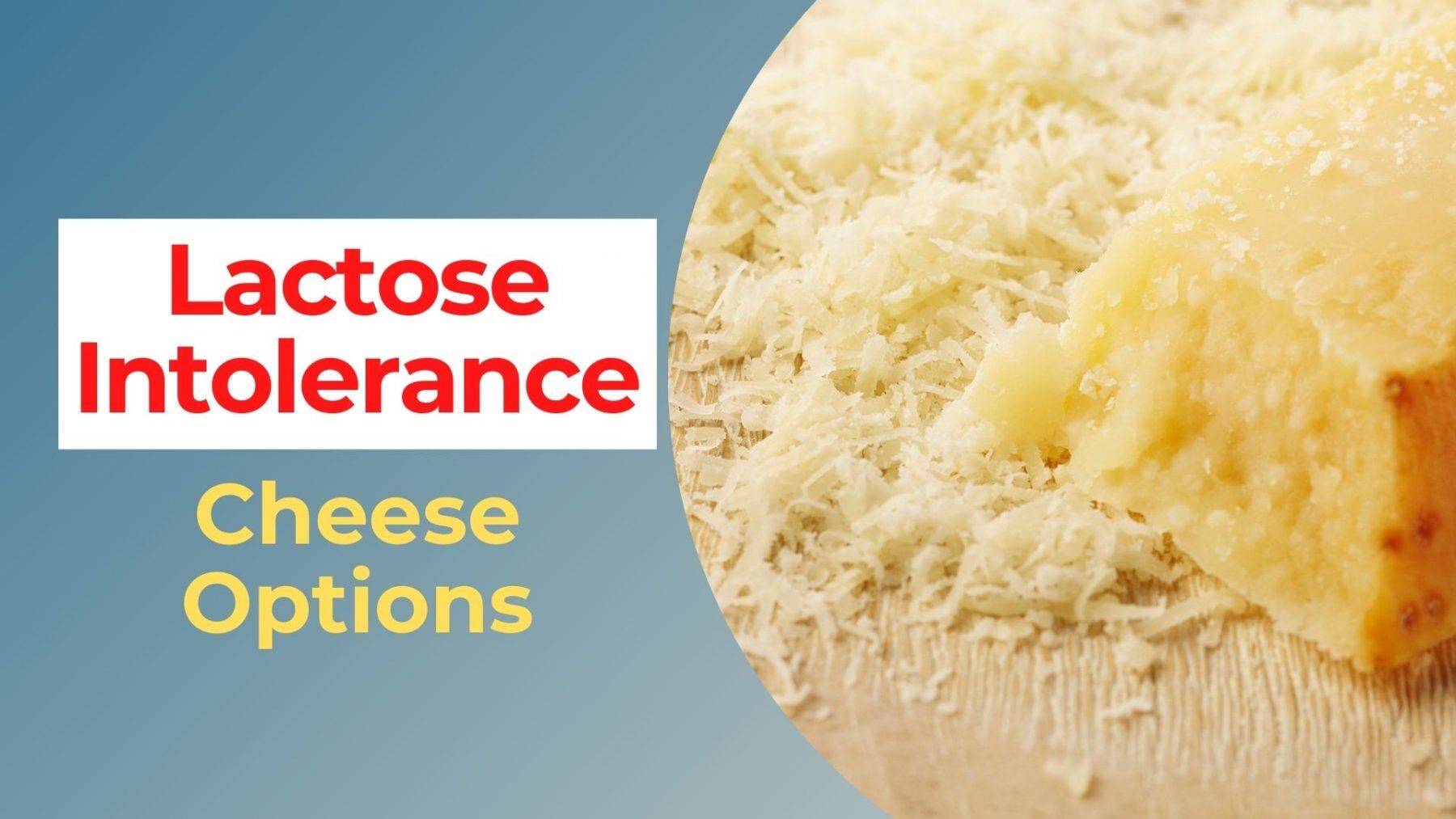
So is Brie high in lactose or low in lactose. You literally have it listed as one of the best for people with intolerance issues…. and you have it listed as one of the worst.
"Brie is a white cheese that has become popular in the United States over recent years. It’s creamy texture and mild flavor makes it an excellent option for lactose intolerant individuals!
The lactose content of Brie ranges between 0.0 to less than 0.50 percent lactose per serving size. Thus making Brie one of the lowest lactose cheeses out there!"
"Cheese with the highest lactose include cheese spreads, soft cheeses like Brie or Camembert, cottage cheese and mozzarella.":
Thanks, great catch, definitely an error. Updated now to remove brie from the highest list. Here’s where I’m reading – https://lactosefree101.com/brie-lactose-free/
Interestingly, “Lactose content can be so low in Brie that it is nearly undetectable, yet since it does generally contain some amount of lactose, however small, we can’t call it a lactose-free food”